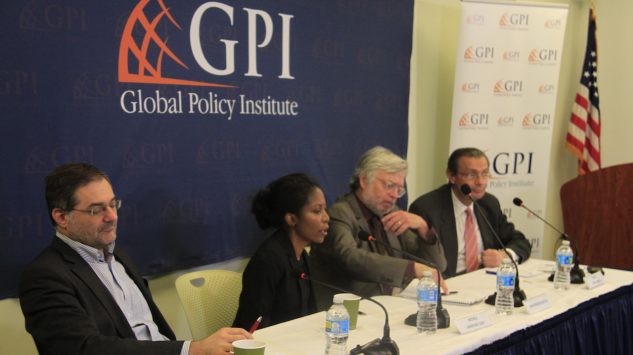Events

The French Elections and Rising Nationalism in Europe
Policy Experts convened by GPI forecast stalemate in France
A panel of experienced observers of the French political scene was convened on April 13 by the Global Policy Institute, GPI.
In his welcoming remarks, Paolo von Schirach, GPI President, noted how a victory of anti-EU forces in France would inflict a serious wound to the entire European integration enterprise. Hard to think of any energetic movement towards increased intra-European cooperation without the active support of France, Europe most important country after Germany.
The context
Jean Francois Boittin, a seasoned former French economic and trade issues official, now serving as a Policy Associate at CEPII, a Paris based economic think tank, provided a broad overview of French politics. He pointed out how the current line-up of the favorites to fight in the second round of the forthcoming French elections is almost unprecedented.
Indeed the representatives of the historic center left (the Socialists) and center right (the Republicans) parties do not seem to have a chance to survive the first round. (The first of two votes will be on April 23. The two best placed candidates will face off on May 7).
Stalemate
Joseph Bahout, now a visiting scholar at the Carnegie Middle East Program, and a former French Government official, noted that even though most observers are concerned about the possibility that The National Front, under the leadership of Marine Le Pen, might win the presidency after the second round of voting on May 7, in reality all possible outcomes of this critical presidential vote will most likely yield political stalemate. Bahout observed that the new president –whoever he or she may be– most likely he/she will not be able to create a stable working majority in parliament, given France’s current deep political divisions and ensuing fragmentation, following the virtual collapse of the two main parties.
Fearful French people
Michele Langevine Leiby, a Washington-based writer and attorney with extensive experience in France, pointed out how the general political mood in France has shifted, rather dramatically, in recent years; mostly because of repeated terror attacks. Many citizens are now willing to accept a “strong government”, as long as this would include real protection against new acts of Islamic terror. Many French citizens are afraid; and therefore willing to give the benefit of the doubt to leaders who talk tough about law and order. By the same token, several bloody acts of terror perpetrated by Muslims has increased support for anti-immigrant, anti-Muslim national politicians.
How will this affect Europe?
Will this critical vote affect France’s relations with the European Union? If newly minted would-be national leader Emmanuel Macron wins the presidency, under his leadership the French government would continue to be a champion of European integration.
However, Macron’s problem is that he literally just created a political movement, En Marche! (Translated as: “Let’s Move!”) that lacks true national roots and supporting organizations. Should Macron win the presidency, how would this politically untested finance expert govern? How would he fashion a parliamentary coalition that would allow him to implement his policies?
How to integrate millions of immigrants?
All the panelists agreed that French society is negatively affected by a large and still unresolved immigration problem. How to integrate millions of immigrants, most of them from North Africa and sub-Saharan Africa, many of them Muslims, who are not easily accepted within a predominantly Christian society? This is a huge challenge for the next French President.